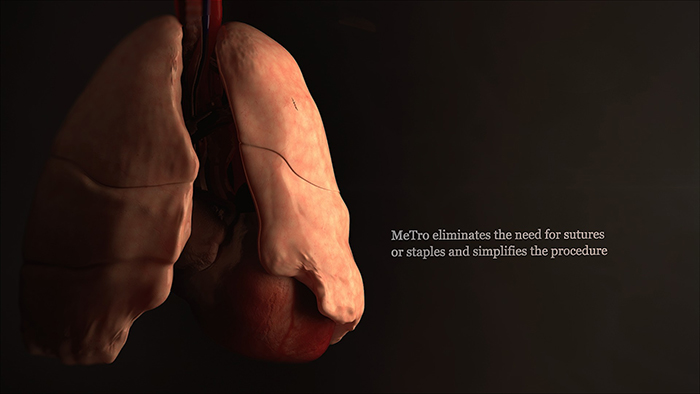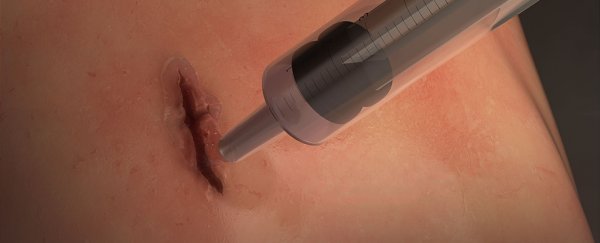Scientists have developed an elastic, adhesive surgical glue that could transform emergency treatments by sealing up critical wounds in the skin or the organs, without the need for staples or sutures.
The gel is based on methacryloyl-substituted tropoelastin (MeTro for short), a hybrid elastic protein, and can be squirted onto internal and external wounds to seal them up and encourage healing.
According to the international team of researchers behind the glue, it could quite literally be a lifesaver, sealing up wounds in 60 seconds without stopping the natural expanding and relaxing of the organ or the skin it's applied to.
To be clear, for now the trials are limited to animal models. But human trials are in the works, and the results to date are incredibly promising.
"The beauty of the MeTro formulation is that, as soon as it comes in contact with tissue surfaces, it solidifies into a gel-like phase without running away," says one of the team, Nasim Annabi from Northeastern University, in Boston.
Once in place, the sealant is put under ultraviolet light to secure it.
"We then further stabilise it by curing it on-site with a short light-mediated crosslinking treatment. This allows the sealant to be very accurately placed and to tightly bond and interlock with structures on the tissue surface."
Wounds treated with MeTro can heal up in half the time compared with stitches or staples, the researchers claim, and if surgery is required then MeTro can simplify that procedure too.
Thanks to a degrading enzyme built into the glue, it can be modified to last for a certain amount of time (between hours and months) depending on the types of injury.
In emergency situations where speed is critical, MeTro could make a huge difference in sealing wounds or lung punctures. In fact it works a little like silicone sealants you might use on tiles in the kitchen or bathroom.
Human trials have not yet started: so far it's been successfully tested on rodent arteries and lungs, and pig lungs.
 MeTro can help with organs that are difficult to patch up, like the lungs. Credit: University of Sydney
MeTro can help with organs that are difficult to patch up, like the lungs. Credit: University of Sydney
"When you watch MeTro, you can see it act like a liquid, filling the gaps and conforming to the shape of the wound," says one of the researchers, Anthony Weiss from the University of Sydney in Australia.
"The potential applications are powerful – from treating serious internal wounds at emergency sites such as following car accidents and in war zones, as well as improving hospital surgeries."
The scientists behind the gel report that it's simple to apply, can be easily stored, and works closely with natural tissue to heal a wound. What's more, it degrades without leaving any kind of toxic leftovers in the body.
For one of the team, Ali Khademhosseini from the Harvard Medical School, the new glue comes from years of work into how MeTro gels can be used to repair the body.
It's also one of several ways researchers are exploring to engineer our body's own natural substances to help repair it when needed.
If the MeTro gel can be further developed into a commercial product, it could well become an essential part of a first responder's toolkit.
"We have shown MeTro works in a range of different settings and solves problems other available sealants can't," says Weiss. "We're now ready to transfer our research into testing on people. I hope MeTro will soon be used in the clinic, saving human lives."
The research has been published in Science Translational Medicine.
